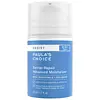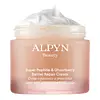Paula's Choice Barrier Repair Advanced Moisturizer Versus alpyn beauty Super Peptide & Ghostberry Moisturizer
What's inside
What's inside
 Key Ingredients
Key Ingredients

 Benefits
Benefits

 Concerns
Concerns

 Ingredients Side-by-side
Ingredients Side-by-side

Water
Skin ConditioningDicaprylyl Carbonate
EmollientEthylhexyl Stearate
EmollientGlycerin
HumectantCocoglycerides
EmollientSqualane
EmollientSodium Polyacrylate
AbsorbentButyrospermum Parkii Butter
Skin ConditioningCeramide NP
Skin ConditioningCeramide AP
Skin ConditioningCeramide As
Skin ConditioningCeramide Ns
Skin ConditioningCeramide EOP
Skin ConditioningSodium Hyaluronate
HumectantAdenosine
Skin ConditioningPalmitoyl Tripeptide-5
Skin ConditioningCitrullus Lanatus Seed Oil
EmollientGlyceryl Stearate
EmollientCaprylyl Glycol
EmollientHydroxyacetophenone
AntioxidantSodium Stearoyl Glutamate
CleansingHexylene Glycol
EmulsifyingTocopherol
Antioxidant2,3-Butanediol
HumectantXanthan Gum
EmulsifyingEthylhexylglycerin
Skin ConditioningSodium Phytate
Sodium PCA
HumectantUrea
BufferingHydrogenated Lecithin
EmulsifyingTrehalose
HumectantPolyquaternium-51
Skin ConditioningTriacetin
AntimicrobialCholesterol
EmollientPhenoxyethanol
PreservativeWater, Dicaprylyl Carbonate, Ethylhexyl Stearate, Glycerin, Cocoglycerides, Squalane, Sodium Polyacrylate, Butyrospermum Parkii Butter, Ceramide NP, Ceramide AP, Ceramide As, Ceramide Ns, Ceramide EOP, Sodium Hyaluronate, Adenosine, Palmitoyl Tripeptide-5, Citrullus Lanatus Seed Oil, Glyceryl Stearate, Caprylyl Glycol, Hydroxyacetophenone, Sodium Stearoyl Glutamate, Hexylene Glycol, Tocopherol, 2,3-Butanediol, Xanthan Gum, Ethylhexylglycerin, Sodium Phytate, Sodium PCA, Urea, Hydrogenated Lecithin, Trehalose, Polyquaternium-51, Triacetin, Cholesterol, Phenoxyethanol
Water
Skin ConditioningGlycerin
HumectantCaprylic/Capric/Myristic/Stearic Triglyceride
EmollientCaprylic/Capric Triglyceride
MaskingSqualane
EmollientCandelilla/Jojoba/Rice Bran Polyglyceryl-3 Esters
EmulsifyingCoconut Alkanes
EmollientC12-16 Alcohols
EmollientPropanediol
SolventPolyhydroxystearic Acid
EmulsifyingBehenyl Alcohol
EmollientGlyceryl Stearate
EmollientCetearyl Alcohol
EmollientSymphoricarpos Albus Fruit Extract
EmollientAcetyl Hexapeptide-8
HumectantAcetyl Octapeptide-3
HumectantCeramide NP
Skin ConditioningCeramide EOP
Skin ConditioningCeramide Ns
Skin ConditioningCeramide As
Skin ConditioningCeramide AP
Skin ConditioningGlyceryl Citrate/Lactate/Linoleate/Oleate
Emulsifying1,2-Hexanediol
Skin ConditioningCetearyl Olivate
Hydrogenated Lecithin
EmulsifyingNephelium Lappaceum Peel Extract
Skin ConditioningPalmitic Acid
EmollientSodium Stearoyl Lactylate
EmulsifyingSorbitan Olivate
EmulsifyingCaprylhydroxamic Acid
Coco-Caprylate/Caprate
EmollientXanthan Gum
EmulsifyingSimmondsia Chinensis Seed Oil
EmollientTasmannia Lanceolata Fruit/Leaf Extract
AntioxidantBisabolol
MaskingSodium Hyaluronate
HumectantHydrolyzed Sodium Hyaluronate
Skin ConditioningTripeptide-29
Skin ConditioningHydrolyzed Pea Protein
Emollient2,3-Butanediol
HumectantLeuconostoc/Radish Root Ferment Filtrate
AntimicrobialHydrolyzed Rice Protein
Skin ConditioningCholesterol
EmollientSodium Benzoate
MaskingWater, Glycerin, Caprylic/Capric/Myristic/Stearic Triglyceride, Caprylic/Capric Triglyceride, Squalane, Candelilla/Jojoba/Rice Bran Polyglyceryl-3 Esters, Coconut Alkanes, C12-16 Alcohols, Propanediol, Polyhydroxystearic Acid, Behenyl Alcohol, Glyceryl Stearate, Cetearyl Alcohol, Symphoricarpos Albus Fruit Extract, Acetyl Hexapeptide-8, Acetyl Octapeptide-3, Ceramide NP, Ceramide EOP, Ceramide Ns, Ceramide As, Ceramide AP, Glyceryl Citrate/Lactate/Linoleate/Oleate, 1,2-Hexanediol, Cetearyl Olivate, Hydrogenated Lecithin, Nephelium Lappaceum Peel Extract, Palmitic Acid, Sodium Stearoyl Lactylate, Sorbitan Olivate, Caprylhydroxamic Acid, Coco-Caprylate/Caprate, Xanthan Gum, Simmondsia Chinensis Seed Oil, Tasmannia Lanceolata Fruit/Leaf Extract, Bisabolol, Sodium Hyaluronate, Hydrolyzed Sodium Hyaluronate, Tripeptide-29, Hydrolyzed Pea Protein, 2,3-Butanediol, Leuconostoc/Radish Root Ferment Filtrate, Hydrolyzed Rice Protein, Cholesterol, Sodium Benzoate
 Reviews
Reviews

Ingredients Explained
These ingredients are found in both products.
Ingredients higher up in an ingredient list are typically present in a larger amount.
2,3-Butanediol is a naturally occurring humectant and solvent. It's created from fermentation and can be found in foods like cocoa butter and sweet corn.
This ingredient attracts and holds onto moisture to boost hydration in skin. According to a manufacturer, this ingredient improves the spreadability of ingredients like vitamin C.
Ceramide AP is formally known as Ceramide 6.
Ceramides are intercellular lipids naturally found in our skin that bonds dead skin cells together to create a barrier. Having a strong skin barrier leads to more firm and hydrated skin.
They are known for their ability to hold water and thus are a great ingredient for dry skin. By bolstering the skin ceramides act as a barrier against irritating ingredients. This can help with inflammation as well.
If you would like to eat ceramides, sweet potatoes contain a small amount.
Read more about other common types of ceramides here:
Ceramide NP
Ceramide EOP
Ceramide AS is formally known as Ceramides 4 and 5.
Ceramides are intercellular lipids naturally found in our skin that bonds dead skin cells together to create a barrier. They are known for their ability to hold water and thus are a great ingredient for dry skin.
Ceramide EOP is formally known as Ceramide 1 and Ceramide 1 A.
EOP stands for a linked Ester fatty acid, a linked Omega hydroxy fatty acid, and the Phytosphingosine base.
Ceramides are intercellular lipids naturally found in our skin. They bind dead skin cells together to create a barrier. The ceramides in our skin have the ability to hold water to keep our skin hydrated.
Ceramides are an important building block for our skin barrier. A strong skin barrier helps with:
If you would like to eat ceramides, sweet potatoes contain a small amount.
Read more about other common types of ceramides here:
Learn more about Ceramide EOPCeramide NP is a type of ceramide and formally known as ceramide 3.
Ceramides are intercellular lipids naturally found in our skin that bonds dead skin cells together to create a barrier. They are known for their ability to hold water and thus are a great ingredient for dry skin.
Ceramides are an important building block for our skin barrier. A stronger barrier helps the skin look more firm and hydrated. By bolstering the skin ceramides act as a barrier against irritating ingredients. This can help with inflammation as well.
If you would like to eat ceramides, sweet potatoes contain a small amount.
Read more about other common types of ceramides here:
Ceramide AP
Ceramide EOP
Ceramide NS is formally known as Ceramide 2. It is one of the major ceramides in the stratum corneum (outermost layer of skin) plays a role in forming a protective barrier.
Due to its structure, skin lipids can be packed tightly and in turn, this strengthens the barrier and reduces water loss.
Studies show conditions like atopic dermatitis can worsen when ceramide NS levels are low.
Learn more about Ceramide NsCholesterol is a class of organic molecules called lipids. It helps hydrate your skin and is essential to having a healthy skin barrier.
Our skin naturally contains cholesterol in the outermost layer. Besides cholesterol, it also contains ceramides and fatty acids. Cholesterol makes up about 1/4 of your skin's outer layer and barrier. Your skin barrier is responsible for keeping allergens and microbes out. Having a healthy skin barrier is also responsible for keeping your skin firm and plump.
Our bodies use cholestrol to create vitamin D, steroid hormones, and more.
Learn more about CholesterolGlycerin is already naturally found in your skin. It helps moisturize and protect your skin.
A study from 2016 found glycerin to be more effective as a humectant than AHAs and hyaluronic acid.
As a humectant, it helps the skin stay hydrated by pulling moisture to your skin. The low molecular weight of glycerin allows it to pull moisture into the deeper layers of your skin.
Hydrated skin improves your skin barrier; Your skin barrier helps protect against irritants and bacteria.
Glycerin has also been found to have antimicrobial and antiviral properties. Due to these properties, glycerin is often used in wound and burn treatments.
In cosmetics, glycerin is usually derived from plants such as soybean or palm. However, it can also be sourced from animals, such as tallow or animal fat.
This ingredient is organic, colorless, odorless, and non-toxic.
Glycerin is the name for this ingredient in American English. British English uses Glycerol/Glycerine.
Learn more about GlycerinGlyceryl Stearate is a mix of glycerin and stearic acid.
It is used to stabilize the mixing of water and oil ingredients. By preventing these ingredients from separating, it can help elongate shelf life. It can also help thicken the product's texture.
As an emollient, it helps soften skin and supports barrier-replenishing ingredients.
In cosmetics, Glyceryl Stearate is often made from vegetable oils or synthetically produced.
This ingredient may not be fungal-acne safe
Fun fact: The human body also creates Glyceryl Stearate naturally.
Learn more about Glyceryl StearateHydrogenated Lecithin is created from the hydrogenation of lecithin (a group of phospholipids). Hydrogenation is a chemical reaction between hydrogen and another element.
This ingredient is an emollient and emulsifier. As an emollient, it helps soften skin by trapping moisture within. As an emulsifier, it prevents oil and water ingredients from separating.
Sodium Hyaluronate is hyaluronic acid's salt form. It is commonly derived from the sodium salt of hyaluronic acid.
Like hyaluronic acid, it is great at holding water and acts as a humectant. This makes it a great skin hydrating ingredient.
Sodium Hyaluronate is naturally occurring in our bodies and is mostly found in eye fluid and joints.
These are some other common types of Hyaluronic Acid:
Learn more about Sodium HyaluronateSqualane is an emollient that helps the skin hold onto moisture. It's an oily liquid that occurs naturally in certain types of fish and plant oils.
Because squalane boosts hydration in the skin, it also comes with plenty of benefits: it is an antioxidant and can help fight free radicals and skin damage. Squalane is also found to have a detoxifying effect when applied.
Squalane comes from squalene, which occurs naturally within the sebum of our skin. It is one of the oils our skin produces to keep itself hydrated. Squalane is the hydrogenated version of squalene and has a longer shelf life.
Research shows that squalane is non-irritating (even at 100% concentration).
In general, it's a fantastic ingredient. It does a great job at hydrating the skin, and it's suitable for those with sensitive skin.
The source of squalane may impact malassezia / fungal acne. This is because olive oil derived squalane can contain impurities such as fatty acids and plant waxes. Sugarcane derived squalane is recommended for anyone with malassezia concerns.
Is squalane vegan?
This depends on the source. Squalane can be derived from both plants and animals. Most squalane used in skincare comes from plants.
Please note: the source of squalane is only known if disclosed by the brand. We recommend reaching out to the brand if you have any questions about their squalane.
Read more about squalene with an "e".
Is squalane an oil?
Squalane is often called an oil, but it’s technically not; it’s a hydrocarbon, meaning it’s only made of carbon and hydrogen, unlike true oils which are triglycerides made of fatty acids and glycerol.
The term “oil-free” isn’t regulated, so companies can define it however they want. Some exclude all oils, while others just avoid mineral oil or comedogenic oils.
While some people avoid oils thinking they cause breakouts, the right kind of oil (or oil-like ingredient like squalane) can actually help balance and hydrate your skin. It’s worth testing out simple oils or squalane to see what works best for your skin.
Learn more about SqualaneWater. It's the most common cosmetic ingredient of all. You'll usually see it at the top of ingredient lists, meaning that it makes up the largest part of the product.
So why is it so popular? Water most often acts as a solvent - this means that it helps dissolve other ingredients into the formulation.
You'll also recognize water as that liquid we all need to stay alive. If you see this, drink a glass of water. Stay hydrated!
Learn more about WaterXanthan gum is used as a stabilizer and thickener within cosmetic products. It helps give products a sticky, thick feeling - preventing them from being too runny.
On the technical side of things, xanthan gum is a polysaccharide - a combination consisting of multiple sugar molecules bonded together.
Xanthan gum is a pretty common and great ingredient. It is a natural, non-toxic, non-irritating ingredient that is also commonly used in food products.
Learn more about Xanthan Gum